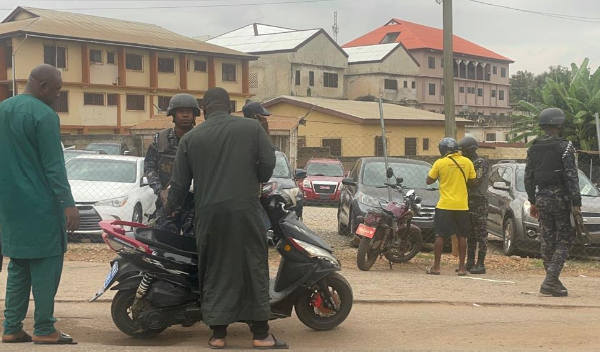A palpable tension has descended upon Asawase, a bustling suburb within the Kumasi Metropolis, as the Ashanti Regional Police Command ramps up its efforts to apprehend suspects linked to the recent killings of two men, including a Kusasi Chief, Alhaji Abdul-Malik Azenbge.
The gruesome killings, occurring over the past three days, have prompted a significant increase in police visibility and aggressive operational tactics across the city.
In the wake of these audacious attacks, police have launched a massive dragnet operation. At the same time, armed security personnel have been deployed to the Manhyia Palace located in the Ashanti regional capital.
Major streets throughout the Kumasi Metropolis are now dotted with police barriers, where officers are conducting rigorous snap checks on both cars and motorbikes.
This intensified scrutiny specifically targets motorbikes, which authorities believe have been the getaway vehicle of choice for the armed suspects.
In response to the violence, the Ashanti Regional Security Council (REGSEC) has introduced strict measures, including a ban on the use of motorbikes in Asawase and nearby communities after 7 p.m.
Intelligence suggests the assailants are heavily armed, reportedly with AK-47 assault rifles, adding to the grave concerns of residents.
The ban also applies to unregistered motorbikes, mopeds without lights, and the wearing of smocks, items believed to be used to conceal weapons.
The Ashanti Regional Minister, Dr. Frank Amoakohene, who signed the statement, said the measures are necessary to restore calm and prevent further attacks.
Ashanti Regional Police Commander, DCOP Emmanuel Teye-Cudjoe, sought to allay public fears while affirming the unwavering commitment of the Command.
“Every effort is being made to identify and apprehend the perpetrators,” DCOP Teye-Cudjoe assured the public.
He urged residents to “remain calm and cooperate with the police by providing any relevant information that could aid in the investigation,” emphasising the crucial role of community intelligence in solving such high-profile cases.
Escalating Gun Violence and Public Safety Concerns:
The murders in Asawase fit into a disturbing pattern of increasing gun violence across Ghana.
In 2024, the National Commission on Small Arms and Light Weapons reported a 27% increase in gun-related homicides compared to the previous year.
The Ashanti Region, in particular, has consistently been identified as a hotspot for such incidents, often linked to land disputes, chieftaincy conflicts, political vigilantism, and organised crime.
The proliferation of illicit firearms, including sophisticated weapons like AK-47s, remains a significant challenge for security agencies.
Data from the Ghana Police Service indicates that illegal firearms are involved in approximately 70% of all violent crimes in the country.
Myjoyonline
ALSO READ:


